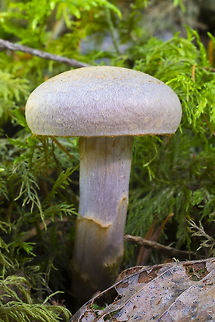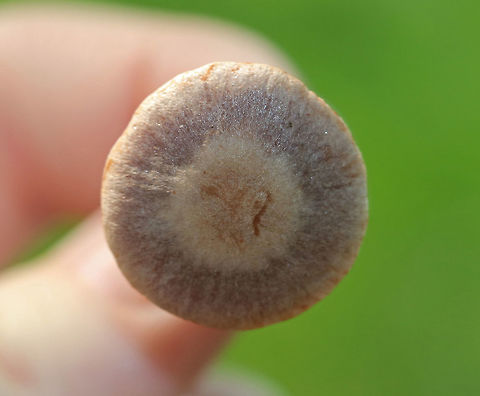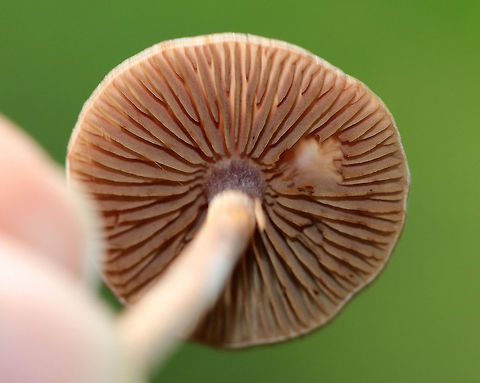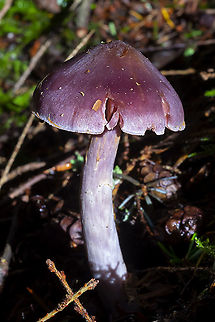
Appearance
The cap is up to 5 cm , initially almost spherical, then expanded convex and finally flattened. The cap has a broad, blunt and low umbo, which frequently lies in a depression since the margin which is initially rolled inward, then straight, often becomes turned upward. The cap cuticle is dry and difficult to peel. The cap surface is dry or humid, non-shiny in the center, but shiny towards the margin which is covered with fibrils when young. The cap is almost uniformly colored dirty rusty-brown or ashy-brown to grayish-tan, sometimes slightly paler towards the margin, with or without a faint grayish-violet tinge when young.The gills are moderately crowded, about 4 mm wide when mature, thin, and whitish-blue, grayish-blue or pale lilac when young. As the mushroom matures, the gill color rapidly fades and soon becomes brown, then a rusty-clay color, without any trace of the blue characteristic of young specimens. The gill attachment to the stem is adnate and emarginate . The edge of the gills is pale, and the edge ranges from finely denticulate to straight.
The stem is 6–8 cm long and 0.5–0.8 cm thick, cylindrical above, slightly club-shaped below, and usually somewhat curved. It is initially very fibrillose, later silvery shiny and wavy, violet or grayish violet at the apex when young, more gray or grayish-brown at the base. The violet coloring soon disappears and then the stem is whitish or pale clay brownish and silkily fibrillose. Beneath the cap there is a golden yellow ring-like region. On the rest of the stem there are sometimes remnants of the partial veil as yellowish-saffron hairy tufts, which form incomplete rings or scattered minute scales. The cortina is thick, whitish, and lasts only a short time.
The flesh in the cap is thin, rarely thicker than 0.5 cm , whitish to pale violet or pale lilac in the upper part of the stem when young, but soon fading, grayish-white in the lower part of the stem. Its smell is faintly fruity, and its taste mild. It is an edible mushroom but insubstantial.
The spore deposit is rusty-brown. The spores are spherical to egg-shaped, with a distinct apiculus , finely verrucose, 5.7–9 by 7–8.5 μm. The basidia are four-spored and measure 30–40 by 8–9 μm.

Naming
The species was first described as ''Agaricus anomalus'' by Elias Magnus Fries in 1818. Fries later transferred it to the genus ''Cortinarius'' in 1838 in his ''Epicrisis Systematis Mycologici''. Friedrich Otto Wünsche placed it in ''Dermocybe'' as ''Dermocybe anomala''.Phylogenetic analysis suggests that ''Cortinarius anomalus'' is closely related to ''Cortinarius collinitus'', ''Cortinarius violaceus'', and ''Cortinarius odorifer''.
The fungus is commonly known as the "variable webcap". The specific epithet ''anomalus'' is derived from the Latin word for "paradoxical".''Cortinarius alboviolaceus'' is silvery-white to gray-violet when young and has a thick, white fibrillose veil, a bulkier stem, and elliptical spores.

Distribution
''Cortinarius anomalus'' is a common species in deciduous, mixed, or more rarely coniferous woods. The fruit bodies appear late in the summer and autumn throughout the temperate zone of the northern hemisphere.
Habitat
''Cortinarius anomalus'' is a common species in deciduous, mixed, or more rarely coniferous woods. The fruit bodies appear late in the summer and autumn throughout the temperate zone of the northern hemisphere.References:
Some text fragments are auto parsed from Wikipedia.